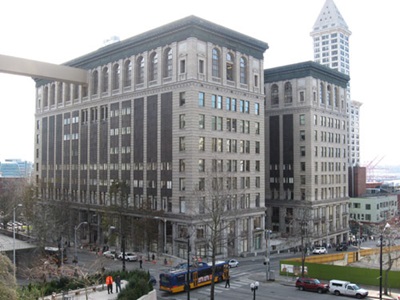Please E-mail suggested additions, comments and/or corrections to Kent@MoreLaw.Com.
Help support the publication of case reports on MoreLaw
Date: 02-21-2023
Case Style:
Fischer Studio Building Condo Owners Assoc. V. City Of Seatte, Et Al.
Case Number: 83801-6
Judge: Linda Coburn
Court: Washington Court of Appeals, Division I on appeal from the Superior Court, King County
Plaintiff's Attorney: Bryan James Telegin
Description: Seattle, Washington condominium law lawyers represented the parties in a dispute regarding the adverse impact on the light and glare from a new 46-story mixed-use apartment building.
The Fischer Studio Building is an eight-story residential condominium
located at 1519 Third Avenue in downtown Seattle. In 2018, developers
(Applicant)1 proposed to replace a four-story building and surface parking lot that
sit southwest across an alley from the Fischer building. The proposed
development (the Project), at 1516 Second Avenue, would be a dual-tower mixed
use residential high-rise with its main entrance on Second Avenue. The 46-story
project would include a 484-foot tower and a 160-foot tower connected by
columns and would house 531 apartment units, retail, and parking for 268
vehicles. The plans included a double-height lighted lobby between the two
towers.
In November 2019, the city’s Design Review Board recommended that the
design of the Project be approved, subject to the condition that it provide
additional information related to the lighting feature in the lobby and any glare it
would create in the alley facing the Fischer Building.
The Seattle Department of Construction and Inspections (SDCI) is the
agency tasked with evaluating the project under SEPA. In January 2021, the
SDCI issued a determination of non-significance under SEPA. Fischer filed a
notice of appeal to the city’s hearing examiner. Fischer challenged the
determination of non-significance under SEPA, asserting that (1) SDCI “did not
collect, analyze, or require the necessary and adequate information upon which
to make a determination on whether the proposal would have significant adverse
impacts related to loss of light and human health”; and (2) “the Design Review
Board’s final recommendation reflects inconsistent application of the design
review guidelines and contradicts prior decisions regarding the project site.” 2
After a hearing that occurred over five days in June, the hearing examiner
issued its findings and decision in August 2021. The examiner found that Fischer
had failed to establish evidence of probable, significant impacts from the loss of
light. It also found that Fischer had failed to establish that the City had
inconsistently applied its downtown guidelines to this Project as compared to
another 2015 proposed development, Urban Visions, for the same location. The
hearing examiner reasoned that the projects differed from one another.
Fischer next filed a complaint in King County Superior Court under the Land
Use Petition Act (LUPA). On February 15, 2022, the court issued an order and
judgment dismissing Fischer’s LUPA appeal. The court concluded that Fischer
failed to meet its burden to demonstrate that any of the standards set out in RCW
36.70C.130(1) were met, and that there was no clear error in the hearing
examiner’s findings related to SEPA. The court also concluded that there was no
clear error in the hearing examiner’s rejection of Fischer’s claim that the design
review board had inconsistently applied the applicable design guidelines. The trial
court denied the petition and dismissed Fischer’s complaint with prejudice.
Outcome: Affirmed.
Plaintiff's Experts:
Defendant's Experts:
Comments:
Find a Lawyer
Find a Case


